Exxon Mobil on Tuesday reported its fourth consecutive quarterly loss on Tuesday as the pandemic continued to weigh on energy demand and oil and natural gas prices.
In the worst year for the company in four decades, Exxon said it lost $22.4 billion in 2020, compared with a profit of $14.3 billion in 2019. A big chunk of the company’s losses came from $19.3 billion in write-downs in the last three months of the year as the company marked down the value of U.S. natural gas fields acquired when gas prices were far higher before fracking flooded the market a decade ago.
Exxon sharply cut spending on exploration and production by $21.4 billion, or 35 percent, last year because of the pandemic.
“The past year presented the most challenging market conditions Exxon Mobil has ever experienced,” said Darren W. Woods, the company’s chairman and chief executive. He added that the company ended the year as “a stronger company” with a “flexible capital program that is robust to a range of market scenarios and focused on our highest-return opportunities.”
There were some signs of recovery in the fourth quarter. Excluding its write-downs, Exxon made a small profit of $110 million in the quarter as commodity prices began to recover.
Exxon’s large chemical business earned $691 million, its best quarterly result since 2018. Oil production in the Permian basin straddling Texas and New Mexico increased by 42 percent in the quarter compared with the fourth quarter of 2019. After a slow start in 2019, oil production in the deep waters off the coast of Guyana ramped up to 120,000 barrels a day and is expected to increase significantly over the next five years.
Early in 2020, there were persistent concern among investors that the company would cut its dividend, but as oil prices surged above $50 a barrel in recent weeks, those fears have subsided. The company’s stock price has recovered by roughly 40 percent since November. Exxon was up about 2 percent in early trading on Tuesday.
Under pressure to show progress on curbing emissions, the company said on Monday that it was creating a new business called Low Carbon Solutions to develop carbon capture and sequestration projects around the world.
The company is expected to reorganize its board in the coming months and on Tuesday announced the election of a new member, Tan Sri Wan Zulkiflee Wan Ariffin, a former president of the Malaysian oil company Petronas.
GameStop and AMC One-Week Share Price
GameStop plunged 50 percent on Tuesday, adding to losses from Monday that have brought the stock down by 65 percent in two days as a social media-fueled buying frenzy lost its momentum.
The retreat this week follows a staggering 1,600 percent gain in January, driven mostly by a group of small investors who had bid up the stock and egged on each other on Reddit and other forums. The retreat this week has come in part as trading platforms like Robinhood have restricted their customers’ ability to buy the shares, although, Robinhood had loosened its limits somewhat.
Another factor behind the drop may be that pressure on hedge funds to buy the shares has eased. Those funds had placed bets against the stock with so-called short sales, and as GameStop’s shares rose, they were forced to buy the shares. But last week, the volume of bets against GameStop were cut by more than half.
AMC Entertainment, another stock that had been bid up by the small investors, was down 40 percent on Tuesday.
Another trade that had been attributed to small investors also continued to fade on Tuesday. Silver futures fell 5 percent on Tuesday to $27.90 an ounce, pulling back from an eight-year high reached on Monday.
Over the weekend, online chatter encouraged retail investors to buy silver in an effort to create a “silver squeeze” as attention seemed to move away from the meme stocks of last week. After websites that sold silver coins and bars reported a surge in demand and the largest exchange-traded product tracking the metal reported record inflows, silver futures rose 9 percent on Monday.
U.S. markets
-
Stocks on Wall Street rose on Tuesday, following gains in Asian and European stock markets, as the retail trading frenzy that gripped market watchers for the past week appeared to die down.
-
The S&P 500 rose 1 percent, adding to a gain of 1.6 percent from the day before, ahead of earnings reports from Amazon and Alphabet.
Europe
-
In equity markets, the Stoxx Europe 600 rose 1 percent, the biggest single-day increase in nearly four weeks.
-
The eurozone economy contracted 0.7 percent in the fourth quarter, data published Tuesday showed, putting the region on track for a double-dip recession as it struggles to ramp up its vaccination program. That said, the economic decline at the end of last year was slightly smaller than economists forecast.
Asia
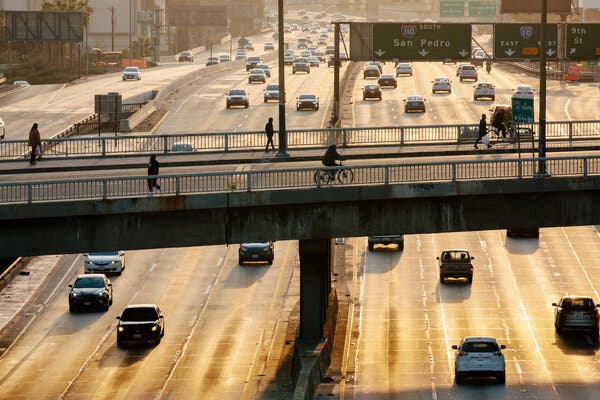
WASHINGTON — Toyota, Fiat Chrysler and several other major automakers said Tuesday that they have dropped their support for a Trump-era lawsuit that sought to block California from setting its own strict fuel-economy standards, signaling that the auto industry is ready to work with President Biden to reduce climate-warming emissions.
The decision by the companies was widely expected, coming after General Motors dropped its support for the effort just weeks after the presidential election. But the shift may help the Biden administration move quickly to reinstate national fuel-efficiency standards that would control planet-warming auto pollution, this time with support from industry giants that fought such regulations for years.
The auto giants’ announcements come on top of a 2020 commitment by five other companies — Ford, Honda, BMW, Volkswagen and Volvo — that they would abide by California’s tough standards.
In a statement, the auto companies, represented by the industry group Coalition for Sustainable Automotive Regulation, wrote, “We are aligned with the Biden Administration’s goals to achieve year-over-year improvements in fuel economy standards that provide meaningful climate and national energy security benefits.”
They added, “In a gesture of good faith and to find a constructive path forward, the C.S.A.R. has decided to withdraw from this lawsuit in order to unify the auto industry behind a single national program with ambitious, achievable standards.”
President Trump had made the rollback of Obama-era fuel economy standards as the centerpiece of his deregulatory agenda. The Obama-era standards, which were modeled on California’s tough state-level standards, would have required auto companies to make and sell vehicles that reached an average fuel economy of about 54.5 miles per gallon by 2025. The standards, which would have eliminated about six billion tons of planet-warming carbon dioxide pollution over the lifetime of the vehicles, stood as the single largest federal policy ever enacted to reduce climate change.
The Trump administration last year rolled back that standard to about 40 miles per gallon by 2026 — a move which would have effectively allowed most of that carbon dioxide back in the atmosphere. California, however, reached a separate deal with the five automakers, in which they agreed to reach a standard of 51 miles per gallon by 2026. The Trump administration, backed by G.M. and other automakers, blocked California’s legal authority to set those standards.
Now that G.M., Toyota and Fiat Chrysler have dropped out of that lawsuit, Biden administration officials are expected to try to make that California deal the basis of a new federal standard.
But if other automakers follow G.M.’s pledge to phase out internal combustion engines by 2035, the whole concept of miles per gallon of gasoline or diesel fuel could soon be moot.
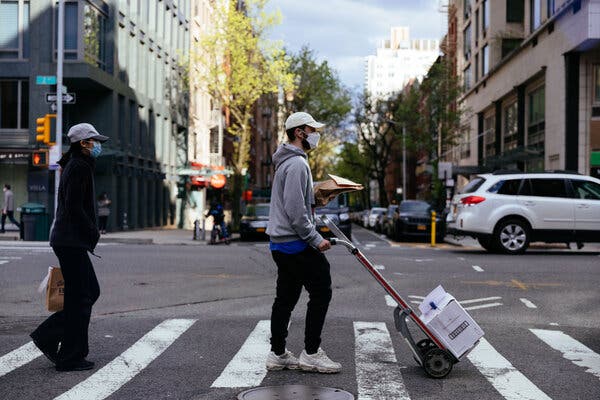
Uber has acquired Drizly, the alcohol delivery service, in a $1.1 billion deal, the ride-hailing company said on Tuesday. The acquisition is part of Uber’s aggressive push to expand its booming delivery business during the pandemic.
The deal, a mix of stock and cash, follows Uber’s recent acquisitions of Postmates, a food delivery service, and Cornershop, a grocery delivery company. Uber has also joined with Nimble to deliver prescriptions in some markets.
Uber will incorporate alcohol delivery into its Uber Eats service and continue to operate Drizly as a stand-alone app, the company said. Lantern, a cannabis delivery service owned by Drizly, is not included in the deal, Uber said.
“We are thrilled to join a world-class Uber team whose platform will accelerate Drizly on its mission to be there when it matters — committed to life’s moments and the people who create them,” said Cory Rellas, Drizly’s co-founder and chief executive, said in a statement.
Delivery has been a lifeline for Uber during the pandemic, which has caused a decline in ride hailing. In the third quarter of 2020, Uber said revenue from rides was down 53 percent while food delivery revenue was up 125 percent. Uber will report fourth quarter earnings on Feb. 10.
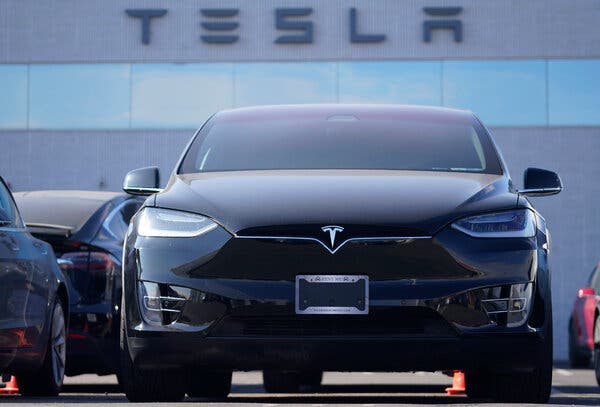
Tesla has agreed to recall nearly 135,000 vehicles after a federal regulator raised concerns about problems with the touch-screen displays in some of the company’s most expensive cars.
The company disagreed with a request made in January by the regulator, the National Highway Traffic Safety Administration, that it recall the cars, but it said that it would proceed “in the interests of efficiently resolving this matter and providing a better experience for the customer,” a Tesla executive said in a letter to the agency that was made public on Tuesday.
The recall affects Model S vehicles from 2012 to 2018 and Model X vehicles from 2016 to 2018. Those are the company’s flagship cars and can cost up to $100,000 or more.
At issue is a memory chip in the center display of the vehicles, which drivers use to control many aspects of their Teslas. The safety agency said when the chip wears out, it can cause the loss of certain functions, including turn signal lighting and the rearview camera display.
“As stated in our letter, the agency tentatively concluded that these vehicles contain a defect related to motor vehicle safety,” the regulator said in a statement. “Safety is NHTSA’s top priority, and timely recalls are crucial to ensuring the safety of drivers, passengers, and other road users.”
Tesla plans to notify owners of the affected vehicles and will replace the component for free, the regulator said. The recall is expected to begin on March 30.
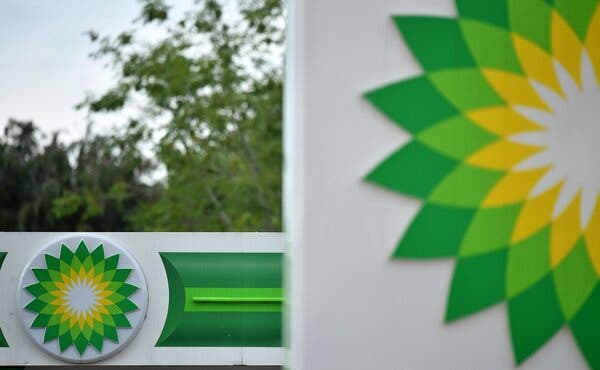
BP on Tuesday reported its first loss in at least a decade, taking a $5.7 billion loss for the year compared with a $10 billion profit for 2019. The company said it eked out a $115 million profit for the fourth quarter of 2020, representing a year-on-year decline of about 95 percent.
Oswald Clint, an analyst at Bernstein, a market research firm, called the quarterly results “terrible” in a note to clients.
BP blamed a host of factors including low demand for its refined products because of the economic slowdown brought on by the pandemic, as well as low prices for oil and natural gas.
Last year, BP’s chief executive, Bernard Looney, announced a shift away from oil and gas toward clean energy like wind, solar and hydrogen. On a call with analysts, though, Mr. Looney acknowledged that the payoff from some of these investments would not come until the 2030s and that the company would remain reliant on oil and gas for profit for the next few years.
BP, based in London, is a major oil and gas producer in the United States, but Mr. Looney said in an interview that he welcomed the environmentally friendly approach of the Biden administration.
President Biden’s new policies had raised questions about the impact on BP’s drilling for oil in the Gulf of Mexico, Mr. Looney said, but the administration’s interest in clean energy was likely to aid BP’s recent investment in offshore wind projects off the east coast of the United States.
“That is one of the good things about being a company in transition,” he said.
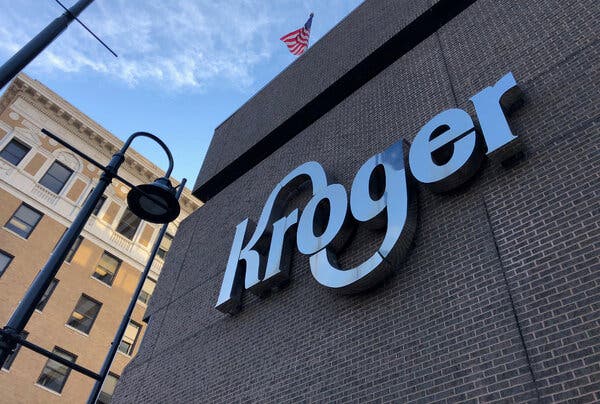
Kroger, one of the largest grocery retailers in the nation, said on Monday that it planned to close two stores in Long Beach, Calif., after city officials passed an ordinance last month requiring large grocery chains to provide workers hazard pay during the pandemic.
“We are truly saddened that our associates and customers will ultimately be the real victims of the City Council’s actions,” Kroger said in a statement.
The ordinance requires grocery stores with at least 300 workers nationally to provide them $4 an hour extra in hazard pay to compensate for the risks they have been taking during the virus outbreaks.
Other local governments, including those in Los Angeles County and Seattle, have passed similar mandates in recent weeks.
The measures come after companies, including Kroger, stopped providing hazard pay over the summer even as outbreaks worsened, though the grocery chain has provided employees with other forms of financial assistance.
Unions and political leaders, like Senator Elizabeth Warren, Democrat of Massachusetts, have criticized the grocery companies for ending hazard pay, while their profits soared during the pandemic.
But the California measures have faced pushback from typically sympathetic allies of low-wage workers. The Los Angeles Times editorial board wrote last month that the proposals unfairly reward grocery store workers at large companies, while excluding other frontline workers who are also facing risks, such as Amazon warehouse employees and meatpacking workers.
The ordinances also exclude workers at nongrocery chains such as Home Depot that have stayed open throughout the pandemic, the newspaper’s editorial noted.
Kroger echoed that sentiment in its statement.
“This misguided action by the Long Beach City Council oversteps the traditional bargaining process and only applies to some, but not all, grocery workers in the city,” the statement said.
Kroger said the two Long Beach stores — a Ralphs and Food 4 Less — were slated for closure on April 17.
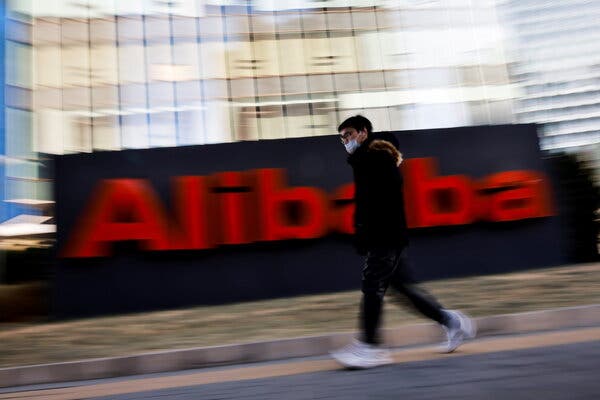
The Chinese e-commerce titan Alibaba said on Tuesday that it was conducting internal reviews of its business in response to an antitrust investigation by the Chinese government, which in recent months has begun scrutinizing the country’s big internet companies like never before.
For many years, the growth of giants like Alibaba was celebrated in China as the fruit of a thriving private sector. Now, regulators in Beijing are more concerned about how the companies’ size and influence are affecting the interests of their customers and competitors, echoing the scrutiny that Western tech giants like Google face in the United States and Europe.
“We approach this antimonopoly investigation with a cooperative, receptive and open mind set,” Alibaba’s chief executive, Daniel Zhang, said on a conference call announcing the company’s latest financial results. “We have a deep appreciation of the significant social and public responsibilities of operating our platform. Beyond complying with regulatory requirements, we will continue to do our best to fulfill our responsibilities to society.”
Mr. Zhang said Alibaba would say more when the investigation was complete. He gave no indication when that might be.
China’s market watchdog announced the inquiry in late December, amid a series of actions by the authorities to rein in tech giants. The month before, officials had abruptly halted plans by Ant Group, Alibaba’s financial-technology affiliate, to go public in Shanghai and Hong Kong, citing the need for new supervision of internet finance. Regulators later ordered Ant to revamp its business, a process that Mr. Zhang said was still ongoing.
Ant’s business prospects and fund-raising plans remain “subject to substantial uncertainties,” Mr. Zhang said.
Like other tech giants such as Amazon, Alibaba has enjoyed strong growth during the pandemic, as lockdowns lead people to depend more on digital services.
China’s resilient economy helped drive a 37 percent increase in Alibaba’s sales in the latest quarter, the company also said on Tuesday. Profits for the quarter were $12.2 billion and revenue was $33.9 billion, beating analysts’ forecasts. Cloud computing revenue grew 50 percent from a year ago, to $2.5 billion. Alibaba said that part of its business was profitable for the first time in the December quarter.
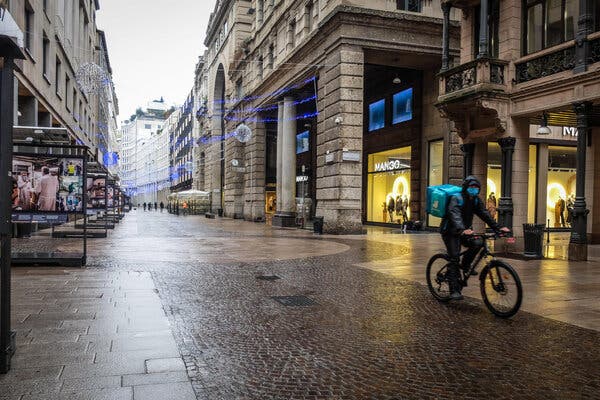
The eurozone economy shrank in the last three months of 2020 as European countries closed shops and restaurants and restricted travel to try to contain the coronavirus.
Economic output in the 19 countries that belong to the eurozone fell 0.7 percent in the fourth quarter compared with the previous quarter, according to a preliminary estimate by the European Union’s official statistics agency said.
For the full year, overall output fell 5.1 percent.
Economists expect the economy to shrink again in the first quarter of 2021, leading to a double-dip recession. The bloc’s economy also shrank during the first half of 2020.
The decline capped a roller coaster year for the eurozone economy. In the second quarter, gross domestic product fell 11.7 percent as the pandemic took hold, then rebounded 12.4 percent in the third quarter as lockdowns eased and firms adjusted to the crisis.
The latest data reflects the malaise that has taken hold as European leaders struggle to vaccinate their citizens, a project that has moved more slowly on the continent than in Britain or the United States.
“The short-term prospects for the European economy remain clouded by a challenging health situation in several countries and an underwhelming start of the vaccination rollout,” Nicola Nobile, lead eurozone economist at Oxford Economics, said in a note to clients.
European factories have largely adapted to the pandemic and are operating almost normally, but stores, restaurants and hotels continue to suffer. More than half of Germans who work in hotels or restaurants, about 600,000 people, are on government-subsidized furloughs and effectively unemployed, according to the Ifo Institute in Munich, a research organization.
Growth figures for all the eurozone members are not yet available, but among the countries that have reported so far, Austria, Italy and France suffered declines in output in the quarter while Germany, Spain and most other countries managed modest growth.
Including countries like Poland, Hungary and Sweden that are members of the European Union but not the eurozone, output in the bloc fell 0.5 percent in the October-December period.
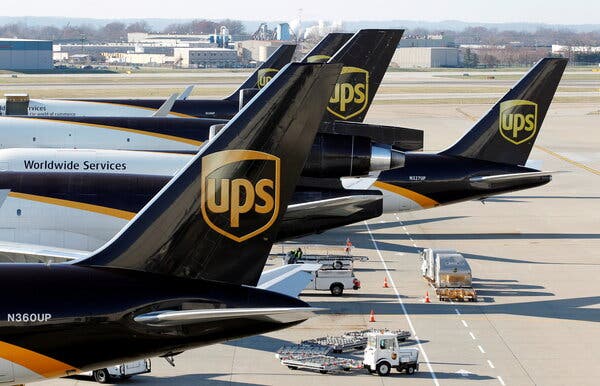
United Parcel Service reported a 21 percent increase in sales, to nearly $24.9 billion, in the final three months of last year, driven in part by a supercharged online holiday shopping season.
“Our financial performance in the fourth quarter exceeded our expectations, and I thank all UPS-ers for their extraordinary efforts to deliver industry-leading service through the holidays,” Carol Tomé, the company’s chief executive, said in a statement.
Ms. Tomé, who took the helm at the company just after the pandemic began, has been putting in place a “better, not bigger” strategy, aimed at improving profit over package volume. Excluding pension costs and a tax charge related to the sale of UPS Freight, the company’s profit per share rose to $2.66 in the fourth quarter from $1.94 a year earlier, far surpassing analyst estimates. The company’s share price was up more than 3.5 percent in premarket trading, but dipped after the market opened.
Despite causing early disruptions, the pandemic accelerated a shift to online shopping, helping to raise the company’s average daily package volume for the year to 24.6 million, a 13 percent increase from 2019. Excluding one-time costs, profit also rose 9.5 percent for 2020, to nearly $7.2 billion.
The company declined to provide a forecast for this year, citing uncertainty caused by the pandemic.
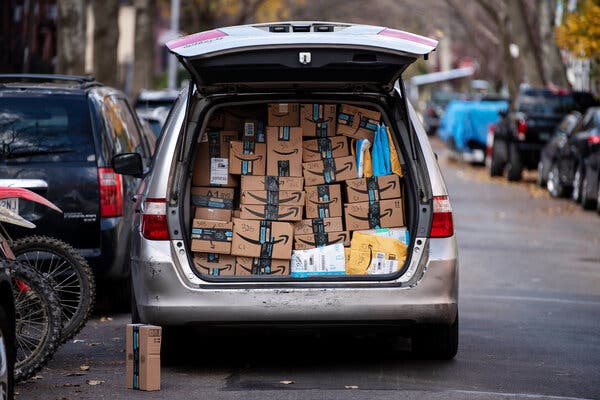
Amazon agreed on Tuesday to pay $62 million to the Federal Trade Commission to settle charges that it withheld tips to delivery drivers over a two-and-a-half year period, in a case that highlights the federal government’s increased interest in gig-economy workers.
The F.T.C. said in an announcement that Amazon had promised its Flex delivery drivers that they would receive 100 percent of all customers’ tips. But starting in 2016, the F.T.C. said, Amazon secretly lowered the hourly delivery wages, which were advertised at $18 to $25, and tried to mask the smaller wages by using customer tips to cover for the smaller hourly pay. The net effect was that the contract workers received smaller overall take-home pay, the agency said.
The practice wasn’t disclosed to drivers but the Flex drivers noticed the compensation reductions and began to complain. Amazon stopped the practice in 2019, after it became aware of the F.T.C.’s investigation, the agency said. The company settled without admitting wrongdoing.
“Rather than passing along 100 percent of customers’ tips to drivers, as it had promised to do, Amazon used the money itself,” said Daniel Kaufman, the acting head of consumer protection at the F.T.C. “Our action today returns to drivers the tens of millions of dollars in tips that Amazon misappropriated, and requires Amazon to get drivers’ permission before changing its treatment of tips in the future.”
Flex workers are classified by Amazon as independent contractors and often use personal vehicles for deliveries of the company’s Prime Now and AmazonFresh items. Customers can give a tip to delivery drivers on the checkout page.
Amazon is facing greater regulatory scrutiny overall. The Seattle company is under investigation for antitrust violations amid growing concerns from lawmakers and regulators about the power of the big tech companies.
The case also illustrates greater bipartisan scrutiny over Big Tech’s treatment of contract workers, who are a growing portion of Amazon, Google and Facebook’s workforces.
“Amazon is one of the largest and most feared corporate empires on the planet, and it is critical that global regulators carefully scrutinize whether the company is amassing and abusing its market power through unlawful practices,” Rohit Chopra, a Democrat and a commissioner, said in a tweet about the settlement.
Amazon said in a statement that its pay for contract workers was among the “best in the industry.”
“While we disagree that the historical way we reported pay to drivers was unclear, we added additional clarity in 2019 and are pleased to put this matter behind us,” it said.





